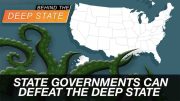
The Tenth Amendment Center has a plan for preventing the National Security Agency (NSA) from making Americans inmates in an electronic prison.
In a new initiative called “Nullify the NSA,” the Los Angeles-based grassroots organization is providing states and activists with tools designed to dismantle critical parts of the surveillance apparatus. One of the most useful of those tools is model legislation drafted by the Tenth Amendment Center.
The Fourth Amendment Protection Act is designed to be adapted by state and local lawmakers for proposal in their respective governing bodies. Laws based on the measure ideally would be enacted on the state level, while counties and cities would pass resolutions reaffirming their commitment to enforce the law.
To its credit, the Tenth Amendment Center admits that this tactic alone will not cure the federal government’s monitoring mania. The group recommends the implementation of “more … aggressive … measures” in order to successfully strike back at the surveillance.
Many of these measures are included in key provisions of the Fourth Amendment Protection Act. According to the website set up by the group to publicize its latest support for state sovereignty, there are at least four crucial parts of the bill that must be enacted by states if they are to effectively end participation with the NSA’s violation of the Fourth Amendment.
The four elements are:
1. Law Enforcement Refusal.
The 4th Amendment Protection Act prohibits the state and any political subdivision in the state from providing material support to any agency collecting information without a warrant describing the person(s), place(s) and thing(s) to be searched or seized. It denies the use of state resources or state funds for these organizations. And, state and local law enforcement would be banned from using information provided by SOD — that’s where local law enforcement is getting unconstitutional, warrantless NSA search info for enforcement actions regarding every-day police work.
2. “We reserve the right to refuse service”
It prohibits the state and any political subdivision in the state from providing services to organizations like the NSA engaging in warrantless spying. This becomes particularly significant when considering a political subdivision of Utah supplies 1.7 million gallons of water to keep the NSA spy grid cool. Turn it off. This also includes a ban on everything from trash collection, use of trash dumps, providing electricity, and the like. Anything and everything — each piece of resistance will make it more difficult and more costly to operate. In some cases, shutting of the water could shut down a spy center without a federal airlift.
3. Ban on corporations
Any corporations filling the space left by a ban on government assistance in #2 above would be forever banned from providing any services for, or on behalf of the state and political subdivisions (local governments). This would give Internet providers and other tech companies economic factors to consider before signing on to turn information over to the NSA.
4. Penalties
There are many. Local governments can lose all funding for assisting the NSA. Employees of the state can be permanently banned from future state employment, and corporations will lose contracts.
Although many in the conservative movement consider nullification a dead issue, a conclusion supposedly decided by the Union victory in the Civil War, the fact is that if state legislatures will enact and enforce bills such as the Tenth Amendment Center’s Fourth Amendment Protection Act, there will be pragmatic effects of the effort.
Many of those who promote nullification as the “rightful remedy” to federal overreach consider Thomas Jefferson and James Madison as the intellectual godfathers of the movement.
The latter, writing in Federalist No. 46, prescribed a state-based treatment for the “madness” of federal usurpation of unconstitutional authority. Madison wrote:
Should an unwarrantable measure of the federal government be unpopular in particular States, which would seldom fail to be the case, or even a warrantable measure be so, which may sometimes be the case, the means of opposition to it are powerful and at hand. The disquietude of the people; their repugnance and, perhaps, refusal to co-operate with the officers of the Union; the frowns of the executive magistracy of the State; the embarrassments created by legislative devices, which would often be added on such occasions, would oppose, in any State, difficulties not to be despised; would form, in a large State, very serious impediments; and where the sentiments of several adjoining States happened to be in unison, would present obstructions which the federal government would hardly be willing to encounter. But ambitious encroachments of the federal government, on the authority of the State governments, would not excite the opposition of a single State, or of a few States only. They would be signals of general alarm. Every government would espouse the common cause. A correspondence would be opened. Plans of resistance would be concerted. One spirit would animate and conduct the whole. The same combinations, in short, would result from an apprehension of the federal, as was produced by the dread of a foreign, yoke; and unless the projected innovations should be voluntarily renounced, the same appeal to a trial of force would be made in the one case as was made in the other.
Key to the Madisonian method is the state governments’ “refusal to cooperate with officers of the Union.” Heretofore, state legislatures and governors have been content to shake their fist at Washington with one hand, while the other hand cashes the federal government’s checks. This has reduced the states to mere administrative units of a consolidated central government. Accordingly, as the level of federal largesse increases, the independence of state governments decreases proportionately.
Often, liberty-loving citizens and their elected representatives in state assemblies hesitate to push a program such as Nullify NSA! because they think the fix is in and that the federal government is too big to fail.
In fact, there is an untapped power in the states and that is their ability to starve the federal behemoth until it is reduced to constitutional size.
By refusing to commit city, county, and state resources (including manpower) to carry out unconstitutional federal programs and edicts, the feds’ ability to run over citizens will be hamstrung.
In an interview with this reporter, Michael Boldin, the founder and executive director of the Tenth Amendment Center, estimated that studies his organization has conducted reveal that “between 80 and 85 percent” of agents administering federal regulations (in the interview he spoke specifically of the Bureau of Alcohol, Tobacco, Firearms and Explosives) are state officers paid out of federal coffers.
Passing bills prohibiting this patronage would bring about an almost immediate reduction in the regulatory strength of the federal government.
Another way states can hamstring the NSA (and other federal agencies operating inside state lines) is to cut off its access to critical infrastructure. This, the Tenth Amendment Center, says, is the federal government’s “Achilles’ heel.” They describe the situation on the Nullify NSA! website:
In 2006, NSA HQ maxed out capacity of the Baltimore area power grid.
“The NSA is already unable to install some costly and sophisticated new equipment. At minimum, the problem could produce disruptions leading to outages and power surges.
At worst, it could force a virtual shutdown of the agency.” August 6, 2006
It’s not just power. This physical limitation is a serious weak point for the NSA.
Imagine the impact! Activists anxious for a pragmatic approach to quashing federal usurpation should rejoice over this disclosure. Neither the NSA nor any other federal agency could continue operations without electricity, water, local security guards, etc. This is a powerful weapon in the arsenal of state sovereignty.
The fact is, if states will begin employing Madison’s method — refusing to cooperate with “officers of the Union,” i.e. the federal government — the lifeblood of the federal leviathan will be drained and the sweet water of liberty will flood into the states, leaving citizens free to enjoy the freedom that is their right.
All the information, documents, and details state legislators would need to get this ball rolling in their respective assemblies are ready and available on the Tenth Amendment Center’s website.
Joe A. Wolverton, II, J.D. is a correspondent for The New American and travels frequently nationwide speaking on topics of nullification, the NDAA, and the surveillance state. He is the host of The New American Review radio show that is simulcast on YouTube every Monday. Follow him onTwitter @TNAJoeWolverton and he can be reached at [email protected]



